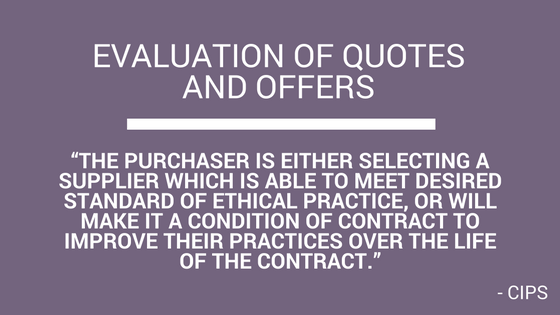

The Modern Slavery Act, introduced into legislation in 2015, has made businesses think about their procurement process in more detail than ever before.
The role of procurement has now changed too, and professionals play an integral role in sourcing suppliers that follow the law and best practice techniques – creating a more transparent supply chain for their business.
As the Chartered Institute of Procurement and Supply (CIPS) describes, “While modern slavery is illegal in every country in the world, it still occurs in every country in the world.” With legislative risk facing businesses that fall foul of modern slavery, it is vital that procurement professionals fully understand, implement and manage the risk of modern slavery in their supply chain.
To help professionals, CIPS have reinforced their seven stages of the procurement cycle to negate the risk of modern slavery.

You should be looking for supply chain vulnerabilities already. These may be broken down into geographical, sector, or product areas – whatever you believe has the greater risk of employing people under what is deemed modern slavery.
To prioritise risk, you should assess your current and prospective purchases against a number of factors, including level of spend, level of business critical risk, and likelihood of non-compliance against company ethical objectives and the law.

Suppliers deemed to be high risk should develop a map of their supply chains. Using various products on the market to map out your supply chain, you should use this research to understand where the labour-intensive part of your supply chain exists – and ensure good human resource management occurs to negate the risk of modern slavery.
This approach gives greater visibility, beyond the three tiers of your supply chain that you may have already identified. Once identified, contractors need to draft, or review, your social and environmental criteria for appointing suppliers.

Supplier engagement should be used in step three to discover the working standards, best practice, and identified issues of each individual supplier. Once this is done, you should be developing a procurement plan to sustain the quality and price of the product or service you require – without compromising on social and environmental standards.
Buyers should be developing procurement plans with time frames, evaluation criteria, and records of who is responsible internally – to help achieve an ongoing procurement plan that ensures new suppliers meet the new procurement criteria.

Implementing new policies, rules, or procurement processes is always the hardest part for procurement professionals, however this is the only way to ensure full compliance throughout your supply chain.
During this stage, buyers must reinforce to existing suppliers the importance of new environmental and social performance, and should use this performance to assess their contractors in order to meet ethical standards. This should be followed by updating all relevant documents to include questions on new standards – such as on your pre-qualification questionnaire (PQQ), invitation to tender (ITT) and request for quotation (RFQ).

Once PQQs have been submitted, you as the buyer, need to research into any inter-related elements that can negate the chances of modern slavery happening, and improve the overall relationship with your suppliers.
Work should be done to reach out to local organisations, trade unions, and other worker’s groups to identify any potential issues that may occur. This research should also support the written claims of the suppliers surrounding their social and environmental practices. If this is shown to be false on inspection, you know it is time to either help them improve, or to look for other suppliers.

Prices, deadlines, quality, and terms of payment are all standard contractual agreements, but ethical and sustainable clauses must now be added to ensure compliance with modern slavery, as well as other social procedures.
Procurement professionals should go above and beyond to ensure suppliers and contractors thoroughly understand the contents of the contract, obtain any feedback, and more importantly, ensure they stick to the agreed key performance indicators (KPIs).

After adding new clauses in supplier contracts regarding ethical standards, you should be reviewing these as part of your KPI supplier programme on a regular basis. This approach allows you to ensure compliance to agreed contracts and policies, but also allows you to gain a snapshot of which suppliers are struggling to maintain your standards.
Many organisations are now moving towards, what is being called, ‘beyond auditing’ to ensure suppliers are focussed on what is needed to help improve in relation to the new legislation. Training and awareness-raising are typical examples of what you should be doing to aid the education of your suppliers.
The scrutiny that organisations are now facing to improve their supply chain’s conformance to modern slavery is at an all-time high. It is up to procurement professionals, such as yourself, to not only create the ethical policies required for your suppliers to abide by, but also to fundamentally implement this into your processes.
From PQQs to internal KPI monitoring documents, you should integrate ethical standards, such as modern slavery policies, into your processes in order to ensure the uppermost compliance throughout your supply chain.
Discover how UK businesses are rising to the compliance challenge across their supply chain by downloading the inaugural Modern Day Slavery Survey 2017 Report. Featuring key findings from procurement and supply chain professionals such as poor internal policies, failing supply chains, and best practice advice to assure long-term slavery compliance.